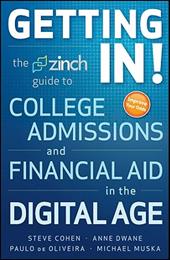 This week on #CampusChat there was a guest that informed us that college is a bad investment for a large percentage of teens. Granted, I could see her point (You can read the transcript here). Many teens aren’t ready for college. I agree it is important to counsel our teens on finding out what they love and guiding them along a career path. But is college truly all about ROI? Do we encourage our kids to go to college solely based on the fact that they will give us a good return on our investment?
This week on #CampusChat there was a guest that informed us that college is a bad investment for a large percentage of teens. Granted, I could see her point (You can read the transcript here). Many teens aren’t ready for college. I agree it is important to counsel our teens on finding out what they love and guiding them along a career path. But is college truly all about ROI? Do we encourage our kids to go to college solely based on the fact that they will give us a good return on our investment?
It’s not that I don’t agree that college, for some, is a bad decision (Should everyone go to college?). Not because it’s a bad investment, but because they aren’t suited for it and would be happier pursuing other options. Should you go into massive debt for a liberal arts degree that leaves you unemployable? Absolutely not (Being realistic about college debt). But, could you get a liberal arts degree and in the process discover your passion? Absolutely.
If you ask both of my children if they thought college was about ROI, they would have different answers. My daughter would say that college for her was so much more than getting that degree and finding a job. She would say that it gave her life experiences. She would say that she found lifelong friends in college. She would say that her study abroad experience was invaluable. She would tell you that she learned about the business world doing internships related to her major. It was at college that she learned independence, budgeting, developed a strong work ethic, got an education, and basically grew up. And she would say that you can’t put a dollar amount on those four years.
My son, on the other hand, had a very different experience. He was not a good student in high school and didn’t show much interest in college, opting for a 4-year term of service in the Marines. After the Marines, he decided to go to college. For him, it was more about pushing himself to attain the degree and proving to himself that he was capable of that level of education. He attended community college for two years and transferred to a 4-year college to finish his degree among the top graduates in his major. And while he did incur some debt acquiring that degree, he would never say it was a waste of time and money or a poor return on investment even though he’s not working in a career related to his liberal arts major.
I’ve known smart kids who knew their career paths at an early age and got to college and failed. I’ve known average students without a clue of what they wanted to be, attend college, find their passion and excel. College opens up your mind, introduces you to experiences and submerges you in academia. Should you be wise about which college you choose and how much you pay for that education and life experience? Of course you should!
I admit. I’m a proponent of college. Perhaps it’s because I never had the opportunity to go. Perhaps it’s because my parents never encouraged me to go. Perhaps it’s because both my kids found value in two different educational paths. For me it’s so much more than ROI. Maybe I’m burying my head in the sand. But I still believe that a college education is something that has great value beyond its cost.
And that, my loyal readers, is one parent’s opinion!










